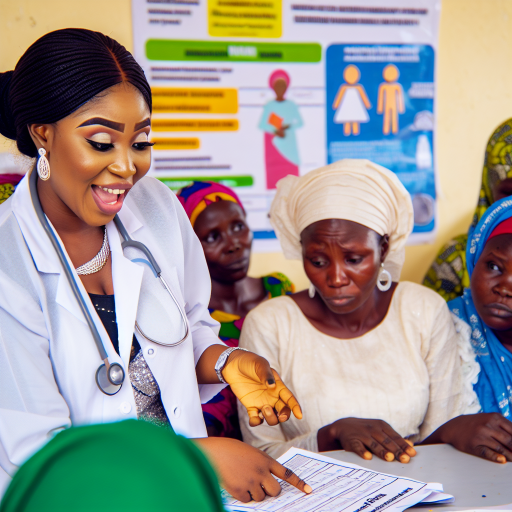Introduction:
A brief overview of public health technology in Nigeria reveals a growing dependence on modern tools and innovations.
Technology plays a crucial role in improving healthcare outcomes.
This improvement is evident in terms of efficiency and effectiveness.
The integration of technology in public health has had a significant impact on Nigerian society.
It is transforming the way healthcare services are delivered and accessed.
Improved Healthcare Access:
Technology has increased access to healthcare services in remote areas.
Telemedicine and mobile health apps provide healthcare remotely.
Statistics show a significant increase in healthcare access due to technology.
- Technology has increased access to healthcare services in remote areas.
- Telemedicine and mobile health apps provide healthcare remotely.
- Statistics show a significant increase in healthcare access due to technology.
Disease Surveillance and Monitoring:
Technology has transformed disease surveillance by enabling real-time data collection.
Data analytics and AI are crucial tools in tracking disease outbreaks.
In Nigeria, the use of mobile applications for reporting diseases has been successful.
One example of a successful program is the Nigeria Centre for Disease Control (NCDC).
The NCDC utilizes advanced technology to monitor diseases and respond promptly.
Through surveillance systems, outbreaks are detected early, preventing widespread transmission.
Technology has significantly enhanced disease surveillance and monitoring in Nigerian society.
Gain More Insights: Challenges Facing Radiologists in Nigeria
Enhanced Diagnosis and Treatment:
Technology plays a crucial role in improving diagnosis accuracy in Nigerian healthcare.
Medical imaging technology such as X-rays, MRIs, and CT scans facilitate accurate diagnoses.
Diagnostic tools like blood pressure monitors, thermometers, and glucose meters aid in assessment.
Role of Technology in Improving Diagnosis:
- Advanced imaging techniques provide clearer insights into a patient’s condition.
- Digital health records enable healthcare providers to access patient data efficiently.
- Telemedicine platforms connect patients with specialists for remote consultations.
Role of Technology in Treatment:
- Robotic surgeries enhance precision, reduce complications, and speed up recovery.
- Medical devices like pacemakers, insulin pumps, and nebulizers improve patient outcomes.
- Smart medication dispensers help patients adhere to their treatment regimens.
Case Studies of Successful Diagnosis and Treatment:
- In Lagos, a patient with a rare heart condition was accurately diagnosed using an MRI.
- Remote consultations via telemedicine allowed a rural patient to receive timely treatment for diabetes.
- In Abuja, robotic-assisted surgery was performed successfully on a patient with prostate cancer.
Explore Further: Radiology Salary Expectations in Nigeria
Public Health Education and Awareness
Technology has revolutionized public health education and awareness campaigns.
Social media platforms and mobile apps play a significant role in disseminating health information.
Tech companies collaborate with health organizations to promote public health initiatives.
Public health education and awareness are crucial components in improving the overall health and well-being of individuals in Nigerian society.
The advent of technology has had a profound impact on how health information is shared, leading to more informed and empowered communities.
One of the most notable ways technology has been utilized for public health education and awareness campaigns is through the use of social media platforms.
Platforms like Facebook, Twitter, and Instagram have become popular channels for health organizations and government agencies to reach a wider audience with essential health messages.
Mobile apps have also played a significant role in spreading health information among the Nigerian population.
With the widespread use of smartphones, individuals can easily access health tips, reminders for vaccinations, and information on disease prevention right at their fingertips.
Furthermore, partnerships between tech companies and health organizations have been vital in promoting public health initiatives.
These collaborations have led to the development of innovative solutions such as health-focused apps, wearable devices, and online platforms that encourage healthy behaviors and provide valuable health resources.
The integration of technology in public health education and awareness has been instrumental in transforming how health information is disseminated in Nigerian society.
With the continued advancements in technology, we can expect to see even greater improvements in public health outcomes and a more health-conscious population.
Uncover the Details: Importance of Medical Biochemistry in Nigeria’s Health Sector

Strengthened Healthcare System:
Public health technology has revolutionized Nigeria’s healthcare system.
Electronic health records have made patient data easily accessible.
Health information systems have improved tracking of diseases and health trends.
Technology has streamlined healthcare service delivery in hospitals and clinics.
Patient care has been enhanced through telemedicine and remote monitoring.
Mobile health apps have empowered individuals to take control of their health.
Transform Your Career with Expert Guidance
Get personalized mentorship consulting that’s tailored to your unique path. Our expert advice is actionable and exclusive.
Get StartedTelehealth services have increased access to healthcare in remote areas.
Technology has facilitated faster diagnosis and treatment of medical conditions.
Health professionals can collaborate seamlessly through digital platforms.
Overall, public health technology has transformed Nigeria’s healthcare landscape for the better.
You Might Also Like: Impact of Nigerian Culture on Dietetics Practices
Challenges and Barriers:
Implementing public health technology in Nigeria faces infrastructure challenges.
Lack of reliable power supply hinders the use of digital health tools.
Many rural areas lack adequate internet access for telemedicine initiatives.
Funding is a significant barrier to implementing advanced health technology solutions.
Government budget constraints limit investment in public health technology infrastructure.
Private sector involvement is essential to bridge the funding gap for health technology.
Digital literacy among healthcare workers and patients is a common barrier to adoption.
Training programs can help improve digital literacy and increase technology adoption rates.
Language barriers can affect the effectiveness of digital health communication tools.
Translation services and multilingual platforms can address language barriers in healthcare technology.
To overcome these challenges and barriers, several strategies can be implemented:
- Improving infrastructure by investing in reliable power supply and internet connectivity.
- Public-private partnerships can help secure funding for health technology initiatives.
- Training programs should be implemented to enhance digital literacy among healthcare workers.
- Community outreach and education campaigns can raise awareness about the benefits of health technology.
- Collaboration between government, private sector, and NGOs can pool resources for technology implementation.
- Regulatory frameworks should be established to ensure the quality and safety of health technology solutions.
- Continuous monitoring and evaluation of technology programs can identify areas for improvement and sustainability.
- Engaging with local communities and understanding their unique challenges can tailor technology solutions effectively.
- Scaling successful pilot programs to reach a larger population and maximize impact on public health outcomes.
- Seeking international partnerships and support can leverage expertise and resources for health technology advancement in Nigeria.
Impact of Public Health Technology in Nigeria
The impact of public health technology on Nigerian society has been profound.
This technology has streamlined healthcare delivery and improved patient outcomes.
Furthermore, it has increased access to medical services for many Nigerians.
As we look to the future, it is crucial that continued investment in technology for healthcare is prioritized.
This will ensure that the Nigerian healthcare system remains efficient and effective.
The implications for the future of healthcare in Nigeria are significant.
Advancements in technology present great potential to further improve healthcare quality, accessibility, and affordability.
These improvements will benefit all Nigerians in the long run.
Additional Resources
Health Impact Assessment: Expanding Public Policy Tools for …




